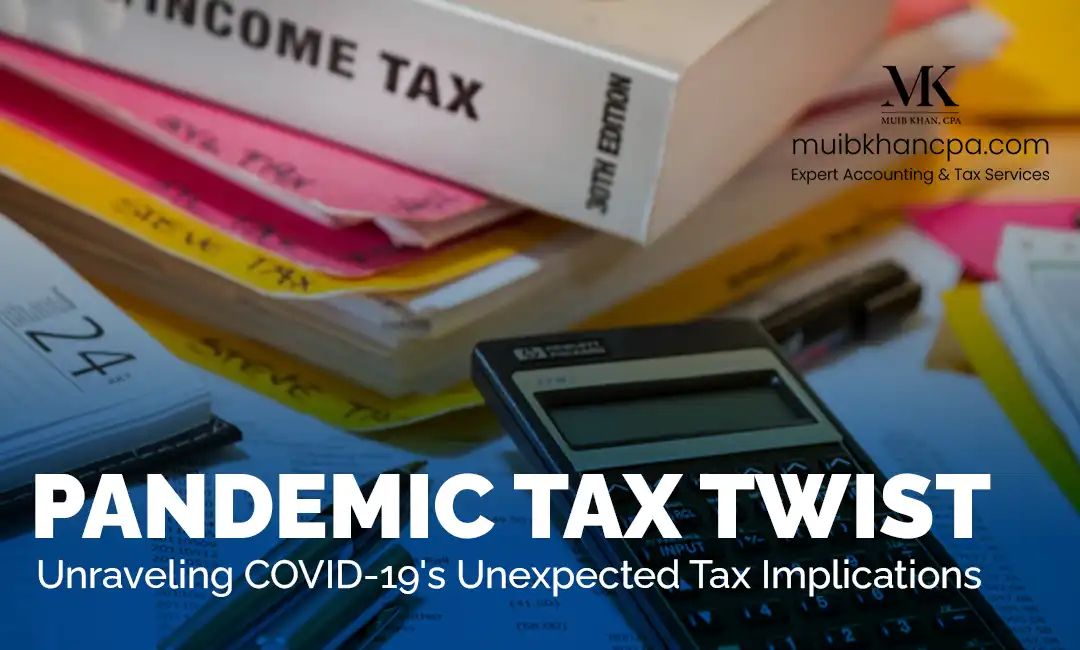Pandemic Tax Twist: Unraveling COVID-19's Unexpected Tax Implications

The COVID-19 pandemic has had far-reaching effects on all aspects of life, including the realm of taxation. For residents of Mississauga and indeed across Canada, understanding these changes is crucial for effective personal tax planning and optimization. This blog post delves into the impact of COVID-19 on tax laws and filings, highlighting new deductions, credits, and essential tips that are pertinent for the upcoming tax season.
The COVID-19 Tax Impact: An Overview
The pandemic introduced several temporary tax law changes designed to alleviate financial pressures on individuals and businesses. These changes include adjustments to tax rates, the introduction of new deductions and credits, and alterations to existing tax benefits. For Mississauga residents, staying informed about these changes is essential for maximizing returns and minimizing liabilities.
Key Tax Law Changes in 2024
As we navigate through 2024, it's important to be aware of the tax law changes that have been implemented in response to the pandemic. These changes are designed to support individuals and businesses as they recover from the economic impacts of COVID-19.
1) Enhanced Home Office Deductions: With remote work becoming the norm, the Canada Revenue Agency (CRA) has expanded eligibility for ho
expenses. Mississauga residents who have been working from home can take advantage of simplified methods to claim these deductions.
2) Changes to the Canada Emergency Response Benefit (CERB): For those who received CERB or other pandemic-related benefits, there are specific tax considerations to keep in mind, including the taxation of these benefits and available deductions to offset owed taxes.
3) Adjustments to Charitable Contributions: Recognizing the increased need for charitable donations during the pandemic, the CRA has increased the deduction limits for charitable contributions made during the tax year.
Navigating Mississauga Tax Guide: Deductions and Credits
Understanding the local implications of these federal changes is crucial for Mississauga residents. Here are some tips to navigate the tax season effectively:
● Utilize Local Deductions: Beyond federal changes, look into local deductions that may apply to your situation. For example, property taxes and certain municipal fees may offer additional opportunities for savings.
● Maximize COVID-19 Related Credits: If you've incurred expenses due to COVID-19, such as purchasing personal protective equipment for your business, ensure you're claiming these as business expenses where applicable.
● Seek Professional Advice: The complexity of tax law changes means that professional advice can be invaluable. A Mississauga tax advisor can provide personalized guidance, ensuring you're taking advantage of all available benefits.
Tax Return Optimization: Strategies for 2024
Optimizing your tax return involves more than just understanding the changes; it requires a strategic approach to planning and filing:
● Early Preparation: Gather your documents early, especially those related to COVID-19 impacts, such as records of received benefits and related expenses.
● Review Eligibility for New Deductions and Credits: Ensure you fully understand the new and temporary provisions that may apply to your situation, such as the expanded home office deductions.
● Plan for Payment of Taxes on Benefits: If you received taxable COVID-19 benefits, set aside funds for any owed taxes, considering the potential for installment payments if necessary.
The COVID-19 pandemic has brought about significant changes to tax laws and filings, presenting both challenges and opportunities for Mississauga residents. By staying informed about these changes, planning strategically, and seeking professional advice when needed, you can navigate the tax implications of the pandemic effectively. Remember, the key to managing your taxes during these times is flexibility and preparedness.
As we move forward, keeping abreast of the latest tax law changes and understanding their implications will be crucial for optimizing your returns and minimizing liabilities. Whether you're an individual taxpayer or a small business owner in Mississauga, the COVID-19 pandemic has underscored the importance of proactive tax planning and the need to adapt to an ever-changing financial landscape.
